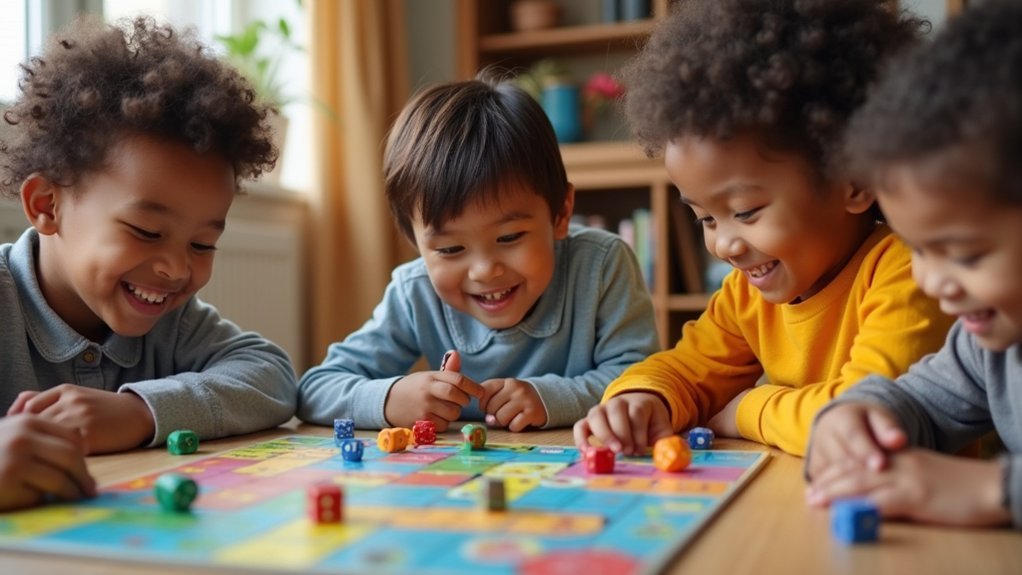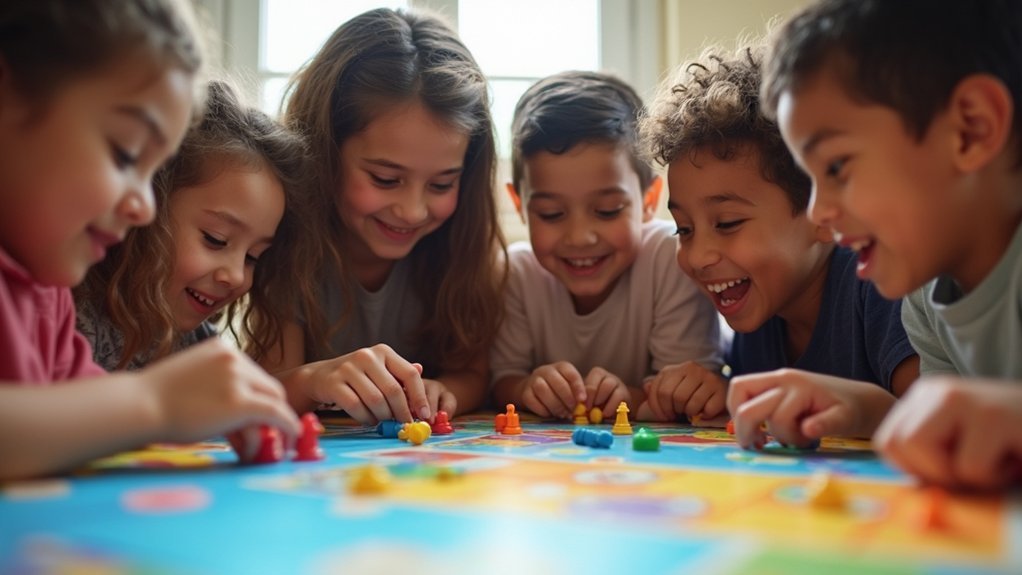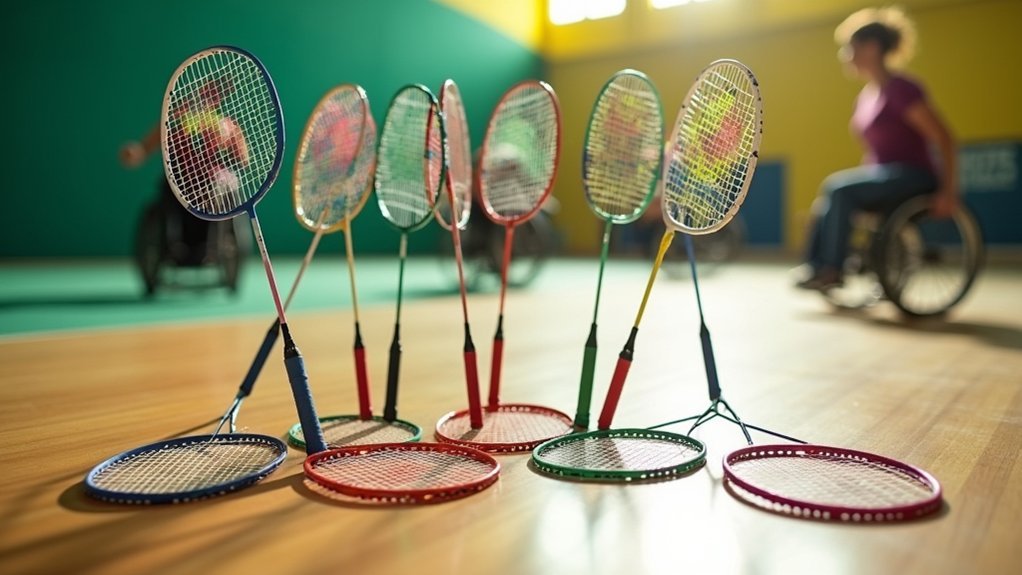Board games help autistic children play by providing a structured environment with clear rules and predictable interactions. You’ll find they reduce anxiety while fostering turn-taking, emotional regulation, and communication skills. These games offer positive sensory engagement through tactile pieces and visual elements that align with autistic strengths. For many children, board games create a comfortable framework to practice social skills without overwhelming pressure. The benefits extend far beyond the game table into everyday life skills.
10 Second-Level Headings for “Why Board Games Help Autistic Children Play”

When exploring why board games effectively support autistic children, it’s important to recognize their unique strengths and challenges. Board games provide structured environments that reduce unpredictability, making social interactions more manageable for autistic children.
Board games create structured environments where autistic children can engage socially without the anxiety of unpredictable interactions.
These games leverage their analytical thinking abilities through logical systems and clear rules. For many autistic children, the predictable nature of board gaming creates a comfortable setting to practice essential social skills like turn-taking and communication.
Research confirms that board games enhance social cognition and theory of mind in autistic individuals, helping them better understand others’ perspectives.
Cooperative board games are particularly valuable as they eliminate competitive pressure while fostering teamwork. The significant representation of autistic traits among board game enthusiasts (30%) further demonstrates how this medium naturally appeals to many autistic children’s learning styles and preferences.
The Structured Environment of Board Games for Sensory Regulation
While traversing a world full of unpredictable sensory experiences, autistic children often seek environments that offer predictability and control. Board games provide exactly this structured environment, with clear rules and defined boundaries that create comfort and reduce anxiety.
When your child engages with board games, they’re interacting within a system that regulates sensory input naturally. The focus shifts to the game board rather than potentially overwhelming direct social interaction. The tactile pieces and visual elements offer positive sensory engagement on their terms.
Turn-taking sequences create predictable rhythms that align with your child’s need for routine. This controlled setting helps them develop emotional regulation skills while participating in social activities.
You’ll notice how the structured nature of these games transforms potentially stressful social situations into manageable, enjoyable experiences.
Turn-Taking Skills and Social Development Through Cooperative Play

For many autistic children, the back-and-forth rhythm of turn-taking presents a significant challenge during gameplay, often triggering frustration when control must be relinquished to others.
Cooperative board games offer an excellent solution. Instead of competing against each other, you’ll find your child engaging in cooperative play where everyone works toward a shared goal. This approach removes the pressure of individual winning or losing, creating a supportive environment where turn-taking feels less threatening.
As you play these games together, you’ll notice how openly discussing moves enhances communication skills and builds teamwork. The structured interactions help reduce social anxiety while developing critical social cognition abilities.
Your child can practice turn-taking skills in a context where relinquishing control becomes part of achieving collective success—transforming what was once challenging into an opportunity for meaningful social development.
Visual Processing Benefits of Game Boards and Cards
Most autistic children possess remarkable visual processing abilities that board games can naturally enhance through their vibrant components and structured layouts. When your child engages with colorful game boards and cards, they’re developing critical visual skills in an enjoyable context.
The predictable arrangement of board games provides visual cues that reduce anxiety during game play, giving autistic individuals a sense of control and comfort. Multi-sensory engagement through touching game pieces complements their visual and spatial strengths, while matching activities improve pattern recognition and memory.
Game illustrations and symbols make rules more accessible, supporting better comprehension and communication between players. By leveraging these visual elements, you’re not just playing a game—you’re providing a structured environment where your child’s natural visual processing strengths can flourish.
Adaptations and Modifications for Different Sensory Needs

You can make board games more accessible for your autistic child by adapting components with softer materials or adding textured elements that provide comfortable sensory input.
Consider implementing visual supports like color-coded turn indicators or simplified instruction cards that reduce cognitive overload while enhancing understanding.
Creating a customized gaming environment—whether by reducing background noise, providing fidget tools, or allowing flexible break times—helps your child enjoy the gaming experience without sensory distress.
Sensory-Friendly Game Modifications
When adapting board games for autistic children, sensory considerations play a crucial role in creating an engaging and comfortable play experience.
You’ll find that replacing hard plastic pieces with soft, tactile alternatives can greatly reduce sensory discomfort for children sensitive to touch.
Visual aids like color-coded instructions or picture charts help clarify turn taking and game progression, especially for those with visual processing needs.
For children with auditory sensitivities, choose games with quieter components or modify existing ones by adding felt to dice cups or game boards.
Remember to offer flexibility in pacing—allowing children to take longer turns or breaks helps prevent overwhelm.
Clear, simple instructions supported by visual cues guarantee children with communication challenges can fully participate, making game time enjoyable rather than stressful.
Visual and Tactile Supports
Building on our sensory-friendly approach, specific visual and tactile supports can transform board games into highly accessible experiences for autistic children.
When designing or adapting games, incorporate clear graphics and color-coding to leverage their strong visual processing abilities. These visual supports enhance understanding and engagement while reducing cognitive load during play.
Tactile adaptations like textured or oversized game pieces provide valuable sensory feedback that helps maintain focus throughout gameplay.
You’ll notice increased participation when you include visual cues such as turn indicators or progress trackers, which reinforce turn-taking concepts and provide needed structure.
Remember to customize the gaming environment with fidget tools or quiet spaces nearby, allowing children to regulate their sensory experiences while still participating fully in the social benefits board games offer.
Building Emotional Regulation Through Win-Loss Experiences
Learning to navigate the emotional rollercoaster of winning and losing represents an essential skill for autistic children, one that board games naturally facilitate. In these structured environments, your child experiences defined win-loss scenarios that provide valuable opportunities to process complex emotions in a controlled setting.
Turn-based gameplay teaches patience as your child waits their turn while managing anticipation and disappointment. When luck influences outcomes, they’ll confront feelings of unfairness that build resilience over time. Through repeated play, you’ll notice your child developing strategies to handle frustration when plans don’t work out.
For children who find competition overwhelming, cooperative games offer a gentler approach to emotional regulation, allowing them to experience collective victories and setbacks while still developing essential coping skills.
Strategic Thinking and Problem-Solving Development
Board games offer powerful cognitive benefits for autistic children as they navigate increasingly complex decision-making scenarios.
When your child plans several moves ahead or analyzes an opponent’s strategy, they’re developing problem-solving skills that extend beyond the gaming table.
Playing board games builds strategic thinking muscles that flex in all areas of life.
Modern games with deeper systems challenge players to exercise theory of mind—anticipating what others might do next—strengthening cognitive abilities that autistic children often find challenging.
As your child engages with games requiring logical reasoning and planning, they’re building transferable critical thinking skills useful in everyday situations.
Cooperative board games are particularly valuable, as they encourage strategic thinking within a collaborative framework.
Research shows that regular board gaming improves cognitive flexibility, helping your child adapt to new rules and challenges—a skill that becomes increasingly important as they encounter diverse social and educational environments.
Communication Enhancement Through Gameplay Rules
When autistic children participate in board games, they enter a communication-friendly zone where the rules provide a predictable structure for interaction.
The clear expectations embedded in gameplay create natural opportunities for your autistic child to practice communication skills without the overwhelming pressure of unstructured social situations.
You’ll notice that board games reduce the need for small talk, allowing your child to focus on game-related conversations instead. As they discuss strategies and moves, they’re developing critical communication skills in a low-stress environment.
Cooperative games are particularly valuable, as they encourage teamwork and open discussion toward shared goals.
The structured turn-taking in board games helps your child practice waiting, responding, and contributing—fundamental communication patterns that transfer to everyday interactions.
Special Interest Integration in Themed Board Games
If you’ve noticed your autistic child’s passionate focus on specific topics, themed board games can transform those special interests into valuable learning opportunities. When a game incorporates elements your child loves—whether dinosaurs, trains, or space—they’ll engage more deeply with both content and social interactions.
| Special Interest | Board Game Benefits |
|---|---|
| Trains/Transportation | Enhances rule-following while reducing social anxiety |
| Animals/Nature | Encourages communication about beloved topics |
| Numbers/Patterns | Supports logical thinking in a meaningful context |
| Characters/Stories | Builds narrative understanding through familiar concepts |
Themed board games provide autistic children with a structured setting where their passions become bridges to social skills rather than barriers. These games create a comfortable environment where the predictable rules and special interest content work together, making social interaction feel safer and more rewarding.
Family Bonding and Connection Through Shared Gaming Experiences
Family board games create a unique opportunity for you and your autistic child to build trust as you work together toward shared goals, fostering deeper connections that extend beyond game night.
The structured nature of board games provides consistent, predictable family time that can become a comforting ritual your child looks forward to each week.
Cooperative games particularly shine by creating an equal playing field where your child’s unique abilities can contribute meaningfully to the family’s success, validating their importance within your family unit.
Building Trust Together
Beyond teaching rules and developing skills, board games create powerful spaces for genuine family connection. When you engage in cooperative games with your autistic child, you’re establishing a foundation of trust that extends beyond the gaming table.
For many children with autistic traits, the predictable structure of board games reduces anxiety, making it easier to open up and interact meaningfully. As you work toward shared objectives, you’ll notice how these gaming sessions foster understanding and patience. Your child learns they can rely on you, while you gain insight into their unique perspective.
The shared victories and challenges experienced during gameplay build emotional bridges that strengthen your relationship. This trust-building process happens naturally as you laugh, strategize, and celebrate accomplishments together, creating lasting bonds through these seemingly simple gaming interactions.
Structured Family Time
When life’s daily chaos threatens to disconnect family members, board games offer a structured anchor point for meaningful togetherness. For autistic children, these shared gaming experiences create predictable environments where they can develop social and cognitive skills while strengthening family bonds.
Cooperative board games transform ordinary evenings into opportunities for connection by:
- Providing a safe, anxiety-reducing structure where your autistic child can practice communication through gameplay rather than forced conversation
- Creating shared memories and inside jokes that build family unity through collaborative problem-solving
- Establishing consistent family routines that everyone anticipates, giving your child stability while enhancing emotional regulation
You’ll notice how structured family time around a board game table naturally facilitates the patience, turn-taking, and teamwork that strengthen relationships while developing essential life skills.
Equal Playing Field
Board gaming creates a remarkable equilibrium that’s rarely found in other family activities. When you sit down to play together, everyone follows the same rules, creating an inclusive environment where children with autism can participate equally with siblings and parents.
Unlike competitive activities that might highlight differences in abilities, cooperative board games require teamwork, allowing each family member to contribute their unique strengths. This shared purpose helps build social connections in a low-pressure setting, reducing anxiety for autistic children while practicing valuable communication skills.
The structure of board games provides a comfortable framework where your child can engage meaningfully with family members.
As you overcome challenges together, you’re not just playing—you’re creating powerful bonding experiences and lasting memories that strengthen family relationships through collaborative achievement and shared enjoyment.
Frequently Asked Questions
Are Board Games Good for Autism?
Yes, board games are good for autism. They provide you with a structured environment where you’ll practice social skills, improve cognitive abilities, and build confidence through predictable rules and enjoyable interaction.
What Are the Benefits of Board Games for Children?
Board games boost your child’s cognitive skills through strategic thinking, enhance social development via turn-taking, build patience, teach rule-following, and create family bonding time. They’re also screen-free entertainment that’s educational and fun.
Does Gaming Help With Autism?
Yes, gaming helps with autism. You’ll find it provides structured social interactions, reduces anxiety, and builds communication skills. Board games especially offer predictable environments where you can practice turn-taking and develop social cognition.
What Games Are Good for Autistic Children?
For autistic children, you’ll find Candyland helps manage emotions, Battleship builds logic, Chess enhances cognitive skills, and Animal Upon Animal improves coordination. Games with clear rules, turn-taking, and cooperative elements are particularly beneficial.
In Summary
When you introduce board games to your autistic child, you’re giving them a powerful developmental tool. They’ll gain social skills, learn to regulate emotions, and practice communication in a structured environment that meets their sensory needs. Whether you choose cooperative games or adapt existing ones, you’re creating opportunities for connection and growth that honor their unique way of experiencing the world.





Leave a Reply